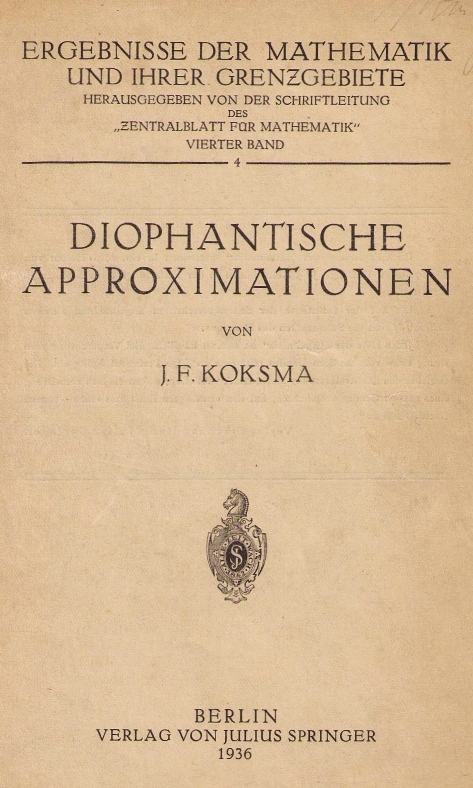Jurjen Ferdinand Koksma on:
[Wikipedia]
[Google]
[Amazon]

 Jurjen Ferdinand Koksma (21 April 1904, Schoterland – 17 December 1964,
Jurjen Ferdinand Koksma (21 April 1904, Schoterland – 17 December 1964,

 Jurjen Ferdinand Koksma (21 April 1904, Schoterland – 17 December 1964,
Jurjen Ferdinand Koksma (21 April 1904, Schoterland – 17 December 1964, Amsterdam
Amsterdam ( , , , lit. ''The Dam on the River Amstel'') is the Capital of the Netherlands, capital and Municipalities of the Netherlands, most populous city of the Netherlands, with The Hague being the seat of government. It has a population ...
) was a Dutch mathematician
A mathematician is someone who uses an extensive knowledge of mathematics in their work, typically to solve mathematical problems.
Mathematicians are concerned with numbers, data, quantity, mathematical structure, structure, space, Mathematica ...
who specialized in analytic number theory.
Koksma received his Ph.D.
A Doctor of Philosophy (PhD, Ph.D., or DPhil; Latin: or ') is the most common degree at the highest academic level awarded following a course of study. PhDs are awarded for programs across the whole breadth of academic fields. Because it is a ...
degree (''cum laude
Latin honors are a system of Latin phrases used in some colleges and universities to indicate the level of distinction with which an academic degree has been earned. The system is primarily used in the United States. It is also used in some So ...
'') in 1930 at the University of Groningen
The University of Groningen (abbreviated as UG; nl, Rijksuniversiteit Groningen, abbreviated as RUG) is a public research university of more than 30,000 students in the city of Groningen in the Netherlands. Founded in 1614, the university is the ...
under supervision of Johannes van der Corput
Johannes Gaultherus van der Corput (4 September 1890 – 16 September 1975) was a Dutch mathematician, working in the field of analytic number theory.
He was appointed professor at the University of Fribourg (Switzerland) in 1922, at the Univers ...
, with a thesis on ''Systems of Diophantine Inequalities''. Around the same time, aged 26, he was invited to become full professor at the ''Vrije Universiteit Amsterdam
The Vrije Universiteit Amsterdam (abbreviated as ''VU Amsterdam'' or simply ''VU'' when in context) is a public research university in Amsterdam, Netherlands, being founded in 1880. The VU Amsterdam is one of two large, publicly funded research ...
''. He accepted and in 1930 became the first professor in mathematics at this university. Koksma is also one of the founders of the Dutch ''Mathematisch Centrum'' (today ''Centrum Wiskunde & Informatica
The (abbr. CWI; English: "National Research Institute for Mathematics and Computer Science") is a research centre in the field of mathematics and theoretical computer science. It is part of the institutes organization of the Dutch Research C ...
'').
One of Koksma's main works was the book ''Diophantische Approximationen'', published in 1936 by Springer. He also wrote several papers with Paul Erdős.
In 1950 he became member of the Royal Netherlands Academy of Arts and Sciences
The Royal Netherlands Academy of Arts and Sciences ( nl, Koninklijke Nederlandse Akademie van Wetenschappen, abbreviated: KNAW) is an organization dedicated to the advancement of science and literature in the Netherlands. The academy is housed ...
.
Koksma had two brothers, Jan and Marten, who were also mathematicians.
See also
* Denjoy–Koksma inequality * Koksma's equivalent classification * Koksma–Hlawka inequality * Erdős–Turán–Koksma inequalityReferences
Literature
*Arie van Deursen: ''The distinctive character of the Free University in Amsterdam, 1880-2005'', Eerdmans Publishing (2008). {{DEFAULTSORT:Koksma, Jurjen 1904 births 1964 deaths 20th-century Dutch mathematicians Members of the Royal Netherlands Academy of Arts and Sciences Number theorists People from Heerenveen University of Groningen alumni